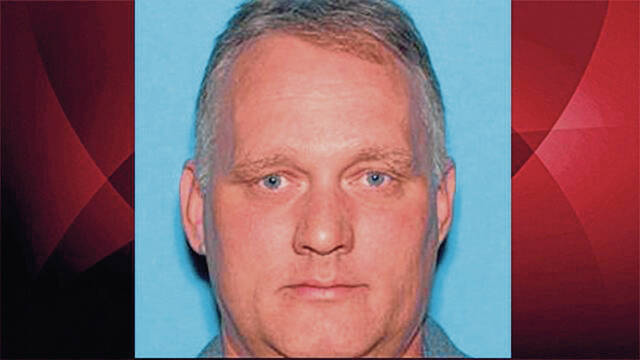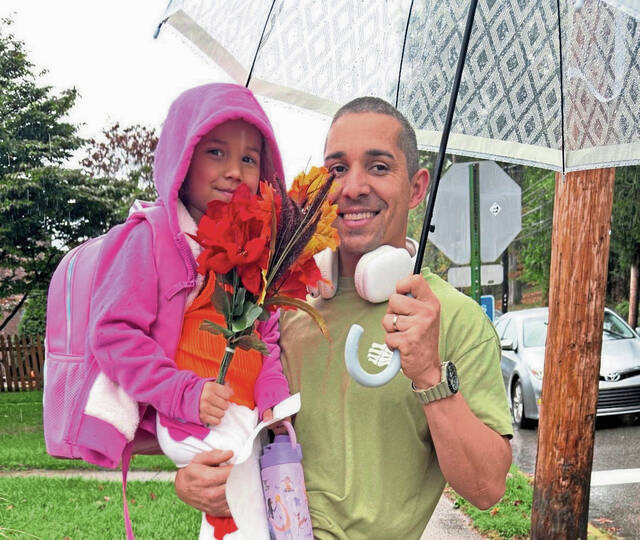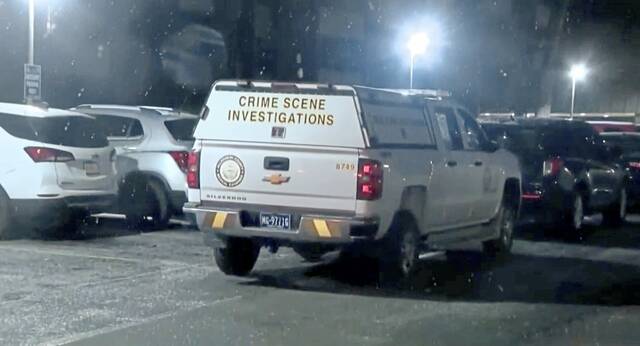Patricia Fine wishes she could have understood what it meant.
She recognized that her 4-year-old nephew was quiet and withdrawn. That he was sad.
“He didn’t get excited and giggly. He didn’t get mad,” she testified Friday. “He was always the same. He didn’t have joy.”
But Fine, who is just 14 years older than Robert Bowers, didn’t know those personality traits might have been indicative of mental illness.
On Friday, Bowers’ aunt and uncle testified on his behalf during the sentence- selection phase of his trial.
Fine will return to the stand on Monday, and the case is expected to go to closing arguments by the afternoon. The trial began May 30.
Bowers, 50, of Baldwin, was found guilty on June 16 of killing 11 congregants at the Tree of Life synagogue in Squirrel Hill. The government is seeking the death penalty because the defendant was motivated by religious hatred. The defense argues that their client has schizophrenia, and that the jury should spare his life.
The victims were Rose Mallinger, 97; Bernice Simon, 84, and her husband, Sylvan Simon, 86; brothers David Rosenthal, 54, and Cecil Rosenthal, 59; Dan Stein, 71; Irving Younger, 69; Dr. Jerry Rabinowitz, 66; Joyce Fienberg, 75; Melvin Wax, 87; and Richard Gottfried, 65.
They were members of Tree of Life-Or L’Simcha, Dor Hadash and New Light congregations.
The defense called 29 witnesses in this sentencing phase of the case, concluding with Fine.
She spent a little less than an hour on the stand Friday, telling the jury about her family’s history. She described her father’s gambling addiction and mother’s alcoholism — as well as what her older sister, Bowers’ mother, was like.
Barbara Bolt, who is almost seven years older than Fine, was a “very, very sad child,” Fine recalled.
Her sister didn’t have friends, and she can’t remember a time when she smiled.
“I don’t remember her being joyful, playing,” Fine said.
She does remember it being particularly difficult to be around her.
“Everything got twisted and distorted and became negative,” she said. “It was like walking on eggshells.”
At age 16, Bolt ran away. She returned a couple years later, still sullen.
Shortly afterward, Fine said, Bolt married Bowers’ father, Randall Bowers, in a ceremony he didn’t even bother to bathe for.
“It’s the saddest wedding photo I’ve ever seen,” Fine told the jury as the image, with only their father smiling, was displayed. “We couldn’t even feign a smile.”
Fine testified that Randall Bowers was mean and never spoke to Bolt’s family. Although the couple and their infant son lived in an apartment, within a year, Bolt had moved back in with her parents and sister. Randall Bowers had been abusive.
Fine remembered meeting the baby, who she still calls Rob, when he was two days old and was wearing a blue-and-white knit outfit.
“I remember thinking he smelled like heaven, and I was absolutely smitten with him,” Fine said.
For several years, Bolt would move in and out of their family home, staying in apartments for a few months before starting the cycle over. When Bowers was 2-1/2, Bolt met another man, married him within weeks and moved herself and her young son to Florida.
Fine’s mother eventually went to Florida and brought Bowers back to Pittsburgh.
“Barbara wasn’t able to take care of herself, let alone a child,” Fine said.
When Bowers was 5 or 6 years old, Fine told the jury, she moved out of her parents’ home and got her own apartment. After that, she mostly saw her nephew at family events.
She remembered him being sad and never wanting to be the center of attention.
“He sat under chairs, not on them,” Fine said, “tucked away, out of sight.”
Sometimes, Bowers would hide under end tables or blankets.
Fine said she never knew her nephew’s elementary school teachers recommended he get counseling. But she did know his home life was not stable, without adequate food or housing.
“He didn’t know if the lights would be on, or if there would be heat when he came home,” she said. “Very early on, I was concerned Rob would commit suicide,” like his father had when Robert was 7 years old.
Those worries existed from the time he was 10, Fine said.
“This was so much deeper than just a child who’s sad because his home life was bad,” she said.
Fine told the jury she had worked as a certified public accountant but was forced to retire in 2011 following a stroke. She now lives on a farm with her husband in Washington County where she runs a business selling and growing pure heirloom tomato seeds.
Just before she took the stand, Fine’s husband, Clyde Munger, 86, also testified.
Munger told the jury that he met Bowers about 30 years ago, and that the two of them shared a fondness for Golden Corral.
Bowers’ favorite thing was the chocolate fountain, and Munger remembered his nephew becoming frustrated when the restaurant took it away.
Since Bowers’ arrest, Munger said he has visited him in the Butler County Prison.
“He’s my nephew, and I love him,” he said.
At one of the visits, Bowers put his hand through a hole so that Munger could reach him.
“I held his hand and said we love him, and we’re praying for him.”
Earlier Friday, the final defense expert witness told the jury that Bowers believed he was acting as a foot solider in a war against Satan when he committed his crimes.
Dr. George Corvin, a psychiatrist who spoke with Bowers for nearly 39 hours over 10 sessions, testified that the defendant has delusional schizophrenia, marked by a belief that Satan will cause a race war ending in the obliteration of whites.
He believes Satan is using Jews in that effort, Corvin said.
“He still envisions what he did as an unfortunate act of violence at the direction of God — that it will save lives,” he told the jury. “He believes he’s a tool for God. I know it sounds absurd.
“It’s psychotic.”
Corvin, whose testimony began on Thursday, was asked by the defense team to determine if their client has a diagnosable mental illness and, if so, what impact any such illness had in possibly mitigating the sentence he faces for his crimes.
The psychiatrist, who practices in Raleigh, N.C., said that Bowers’ schizophrenia made it impossible for him to appreciate the wrongfulness of his conduct or to comport his behavior to the law.
The evidence of that, Corvin told the jury, is “overwhelming.”
“If you look at all of this together, this is the result of a mental illness,” Corvin said. “He thinks he is saving lives. He’d be willing to do this again. He is ready to die to do it.”
Bowers has a long history of mental illness, dating back to adolescence, Corvin said. Still, he was able to live as a marginally functional adult, including holding a job at the Potomac Bakery in Dormont for 14 years.
“He was living on the edges of society,” Corvin said.
There were two significant events in adulthood that precipitated his delusions, according to Corvin.
In 2014, the defendant’s grandfather, with whom he lived and was close, died.
Then in 2016, his best friend died from an overdose.
“They were two substantial losses — pieces of his world helping him still live that meaningful existence to help keep him from going off the rails,” the psychiatrist said.
Then, in 2017, Bowers stopped working.
That’s when he began to develop his ideas about Jews, Corvin said.
“He incorporated that data as some of the end-of-the-world delusional beliefs,” Corvin said. “In our lifetime, he knows the world will end. America will be destroyed in an hour in the evening.”
Satan wants to eliminate Christianity, Bowers told him, to make it easier to kill billions of people on earth.
“It’s got nothing to do with whites. It’s got nothing to do with Blacks. It’s got nothing to do with Jews,” Corvin said. “It’s Satan causing the destruction of Christianity so he can destroy the world.”
Even when he spoke to Bowers in June, Corvin said, the defendant still believed those things.
The psychiatrist testified on direct examination that the defendant is incapable of seeing what he did as wrong.
“He has not expressed remorse,” Corvin said. “Nor, due to his continued illness, is he able to.”
He suggested that Bowers ought to be on anti-psychotic medication, which would help to make his antisemitic beliefs fade into the background — to stop the preoccupation with those thoughts.
But, Corvin said, that also would make him understand that he killed 11 innocent people.
“(When) he realizes, ‘I murdered 11 people for no real reason,’ he would feel remorse. I would be worried he would successfully end his life then,” Corvin said.
On cross-examination by U.S. Attorney Eric Olshan, the prosecution sought to sow doubt in Corvin’s testimony.
Olshan spent a significant amount of time pointing out that Corvin didn’t include many citations in his expert report on Bowers. Corvin said he doesn’t normally do so, particularly for well-documented psychiatric conclusions, such as schizophrenia having a genetic component.
“How many citations in the 29-page report?” Olshan asked.
“Just a couple. It is not something I usually do,” Corvin said.
Olshan contrasted Corvin’s diagnosis with that of Dr. Park Dietz, a renowned psychiatrist and witness for the prosecution who examined Bowers.
Dietz said Bowers does not have delusions and therefore does not have schizophrenia. Instead he diagnosed him with schizoid personality disorder.
Two other defense experts also diagnosed the defendant with schizophrenia, though they did not all agree on what his delusions include.
During cross-examination, Olshan spent a great deal of time going through more than 100 pages of notes taken by Corvin, remarking that much of what he wrote down during his interviews with Bowers was not included in his formal 29-page forensic report.
Corvin told the prosecutor that he knew his notes would be turned over to the government, and that he was attempting to summarize his findings.
For more than an hour, Olshan asked Corvin about details Bowers shared with him about his crime — perhaps attempting to remind the jurors of the horrific nature of the attack.
Like with the others who examined Bowers’ mental health, Corvin said the defendant recounted his actions moving through the synagogue, how he planned the attack and his intentions in committing it.
Like with the other experts, the defendant said he regretted there weren’t more victims.
Bowers also told Corvin he wanted to go to trial so others would hear what he did.
“‘If I have the chance, I will continue the war,’” Bowers told him.








